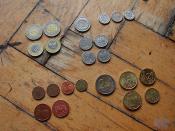Over the last 12-month period ending July 2003, the U.S. Dollar has slid approximately 15% in international value against the Euro (Reuters Investor).
Now that the Iraq war is supposedly over, the market value of the U.S. Dollar in comparison to the Euro throughout the last half of 2003 may solidify the Euro's dominance over the U.S. Dollar in the international investment community.
The United States dollar's continued devaluation against the Euro, may continue for some time. However, as consumer confidence increases, like it has over the recent quarter, it may help to turn this decline around for the US Dollar (Martens). Federal Reserve Chairperson Alan Greenspan in a March 2002 speech pointed out that as foreign investment in the US has been increasing since the mid 1990s, investors will become wary about the soaring deficits in the balance of payments. Simply put, as foreign companies were fueling the U.S.
capital stock market over the past few years, the U.S. is now sending more interest payments and dividends abroad and becoming increasingly dependent on external money. In addition, more international financial transactions, previously monopolised by the U.S. Dollar currency, are now being made in the Euro. A true concern that the U.S. may have, with its long-standing romance with oil, is that OPEC and the international oil selling community will follow this lead and also switch to the Euro (Clark). For example, not counting in the sceptical British, the Japanese, Chinese and other overseas investors may very well decide in the future that they prefer to deal in the Euro which would contribute to a shift in preferred currency for oil and raw materials (Martens).
One certain advantage to a strengthening Euro is that it allows for U.S. goods to be exported at more favourable prices to those countries...



Fair Essay
Good information, written well.
3 out of 3 people found this comment useful.